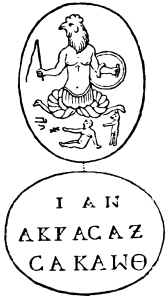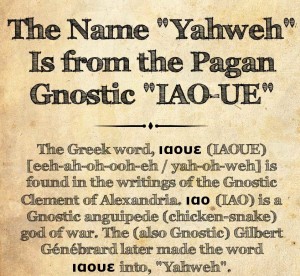Who would actually say “Jesus is accursed” in Corinth? Was Yahweh *really* the name of a pagan god? Of course not!
 Someone sent me a meme, months ago, with a rather serious charge that tied into something that I had previously studied on and since it ties in with an important piece of Corinthian context, I wanted to add it into what I was already planning to teach. Corinth was a hodge-podge of a mess of just the worst problems in Greco-Roman society. I encourage you to check out my previous blogs on the geography, teacher/disciple relationship problems, and lawsuit controversies as well as my teaching on head coverings in Corinthian context.
Someone sent me a meme, months ago, with a rather serious charge that tied into something that I had previously studied on and since it ties in with an important piece of Corinthian context, I wanted to add it into what I was already planning to teach. Corinth was a hodge-podge of a mess of just the worst problems in Greco-Roman society. I encourage you to check out my previous blogs on the geography, teacher/disciple relationship problems, and lawsuit controversies as well as my teaching on head coverings in Corinthian context.
So, what’s the skinny here? Some Greco-Roman “magical” Abraxus amulets were found with one of the Greek forms of the four letter Hebrew Tetragrammaton (there are actually quite a few since it doesn’t directly translate into Greek sounds) on it. Should this be shocking and is it a magic bullet against “Yahweh?” Of course not – it is simply a logical extension of the Jewish Gnosticism that was practiced by Jews in the first century – even those Jews who accepted Yeshua as Messiah (as well as by converted gentiles). When Jews mixed magic rituals with the true faith, what name would one expect them to use? They certainly wouldn’t make one up – after all, they were performing these rituals as part of their observance of “Judaism” – an exceptionally twisted form, I might add. Magic papyri have been unearthed with many Greek forms of the Tetragrammaton, including (1) “Iaoouee,” “Iaoue,” “Iabe,”; (2) “Iao,” “Iaho,” “Iae”; (3) “Aia”; (4) “Ia.” (Source) Not only are forms of the Tetragrammaton used in these magical Abraxus amulets and papyri, but also the names of the patriarchs as well as archangels – Iao, Eloai, Adonai, Sabaoth, Michael, Gabriel, Uriel, Onoel, Ananoel, Raphael, etc. Jewish forms were not the only ones placed on these amulets, mind you – everyone was fair game, including the Persian, Egyptian and of course Greek deities and none of them were serpentine war chickens either. If Yahweh was actually equated with a serpentine war chicken, then so was the Persian Mithras* (god of truth and justice, cattle, harvest and water), the Greek Venus (goddess of love and sexuality), and the Egyptian gods Thoth (god of knowledge and literacy) and Anubis (embalming god, protector of dead) as well as many others – as you can see, there really wasn’t a common theme in who got put on the amulet.
It’s absolutely no different than what we see in I Corinthians 12:2-3 –
You know that when you were pagans you were led astray to mute idols, however you were led. Therefore I want you to understand that no one speaking in the Spirit of God ever says “Jesus is accursed!” and no one can say “Jesus is Lord” except in the Holy Spirit.
where we see a situation where the Name of Messiah is being spoken in conjunction with curses, as well as with pagan practices. It sounds strange because it seems as though Paul is stating that it is impossible for someone who is not saved and filled with the Holy Spirit to say that Yeshua is Lord – but we all know that isn’t true! What’s impossible, is for someone to perform quite another act with the blessings and authority of the Holy Spirit.
Bruce W Winter suggests (based on LXX scholarship into language usage throughout the Deuteronomy curses pg 175) that the phrase is not “curse Jesus (Yeshua)” but instead “Jesus curse!” In fact, in Corinth alone, 27 curse tablets have been unearthed – calling on the pronunciation of a deity’s name in order to induce them to curse (or counter-curse) one’s enemies. This was an ancient practice among pagans and becoming believers evidently did little (if anything) to change this belief.
Here is an example of this thought process in action from a Coptic Christian curse tablet (and it sounds frightening in the way it presumptuously orders God around):
“Any person, every one, who adjures bad things upon me and every one who calls my name evil, and those who curse me… God WILL perform MY judgment against them all… You SHALL bring all of them down… The cherubim, the seraphim, the ten thousand angels and archangels SHALL appeal to the God of Heaven and Earth and He SHALL perform MY judgment against everyone who opposes me. Anyone who curses me, You MUST bring down and abandon him to demons. Yes true, beloved savior.”
Dang. #gotagrudge?
I ask you, how can someone call Yeshua Lord and then boss Him around demanding that He curse their enemies? That isn’t the Holy Spirit they are calling on to enact those curses, no sirree bob. That being said, I once had a social media contact who bragged about cursing her grandma to death in Yeshua’s Name (she was a Pentecostal who was claiming to keep Torah but evidently forgot all the parts in there about loving folks and honoring parents). Couldn’t hit that block button fast enough.
Not only do papyri contain these curses, but so do graves (kept grave robbers at bay… mostly). Cursing was a huge part of the ancient world of magic, it was very much cultural and accepted. As with anything, just because divine names were co-opted by pagans – well, it doesn’t make the Name itself pagan – if anything, it lends legitimacy to that Name. Why would Jews NOT use the Name of God in their gnostic magic rituals if they indeed believed that was the Name of power? Why would early Christians not use the name of Yeshua in curse tablets if they held a belief in the power of that Name? Like everything, it all ties into what things meant to them and of course, in magic rituals it was 100% about pronunciation and ritual. To perform a curse, one needed a tablet with the formula, and to perform magic rituals, one would want an amulet. In pagan magic rituals, pronunciation = power = authority. You would go with the real thing, or you’d go home.
 Now as for the specific charges listed on this meme (which I edited to remove the name of the ministry who made it – I do not attack ministries so please do not do so in the comments) –
Now as for the specific charges listed on this meme (which I edited to remove the name of the ministry who made it – I do not attack ministries so please do not do so in the comments) –
Is the anguiped (abraxas) is a chicken-snake war god – the answer is absolutely not. I can’t find a shred of real evidence anywhere. This is the big problem with simply looking at an amulet, or anything ‘pagan,’ and making assumptions. Yes, the Greek Tetragrammaton is on a pagan amulet, but so are many other names in the same exact format – it is only if we ignore that, that we can even begin to equate Iao with a chicken god – I hope you get that we actually have to ignore the overwhelming cultural and visual evidence (which I will get to in a bit here) in order to argue this point. Context sorts out the bad information from the good. In the same way, a little bit of medical knowledge can lead us to think we are dying, but in the larger context, we realize that our bodies are sometimes actually operating within normal parameters.
Iaoue wasn’t some late date Gnostic construct that was created by Gnostics to describe anything – it was simply a reflection of their recognition of a Name of power – and yes, people that wrote Gnostic documents used those names. Of course, they would!
On the surface, we might see a serpentine war chicken – but what did the ancient Corinthians see? They saw a representation of powers through symbolism. A rooster’s head meant something to them – namely vigilance (crowing) and foresight (they stand taller than other birds and discern morning before there is any light in the sky – unfortunately). The flail is seen commonly in antiquity as the symbol of power and authority. The shield is not a weapon of war but of protection, defense, and wisdom. Serpents are routinely associated with knowledge, cleverness, and guile – but this is not a serpentine war chicken, this is a man with the head of a cock, carrying the flail of divine authority, the shield of wisdom – and from the waist down he has some pretty messed up snake legs. This all meant something specific to them – it was the Greco-Roman way to be figurative in their displays of divinity, not necessarily accurate. Gnosticism was about esoteric knowledge, and the abraxas motifs fit right in. Hellenism was about promoting concepts, and as it was focused on wisdom and perfection it was as infectious as the fruit of the Tree of the Knowledge of Good and Evil.
As for the name of that thing – Abraxas? Scholars admit that all they have are guesses as to what it actually means.
As with anything, we need to be deeply familiar with the things that we teach others. Nowhere do we see this more clearly than with those who ‘teach’ about ancient paganism without intensive studying – how things appear to us are generally 180 degrees off from what it really was to them. I liken it to a person with some aches going onto the internet and learning that they are dying, only to go to the ER and find out that they were simply a bit dehydrated. A little bit of knowledge is the devil’s playground – so if we really want to understand, we need to do the hard research – which generally takes a lot of time, dedication, a willingness to accept that people have not always thought the thoughts that we think now, and in my experience, it takes money as well because the real experts generally don’t give their knowledge away for free (and the book publishers wouldn’t allow them to anyway).
Be sure to check out the related posts about the words Lord, Lord and God, Christ, IHS, and Amen.
*Note: this is Persian Mithras – for an interesting scholarly article on the Roman Mithras by Roger Beck, Professor Emeritus, U. Toronto, a recognized scholar in Mithraism, click here and he is the author of The Religion of the Mithras Cult in the Roman Empire which I have been perusing through. His writings explore the evidence that we actually have in existence of both Persian and Roman Mithras (sadly very little except iconography and inscriptions, no written records of beliefs – that’s the problem with mystery religions, they purposefully kept them mysterious, go figure, they weren’t very accommodating to future historians) and the difficulties of saying exactly what they believed or what they did in spite of the legends that have popped up